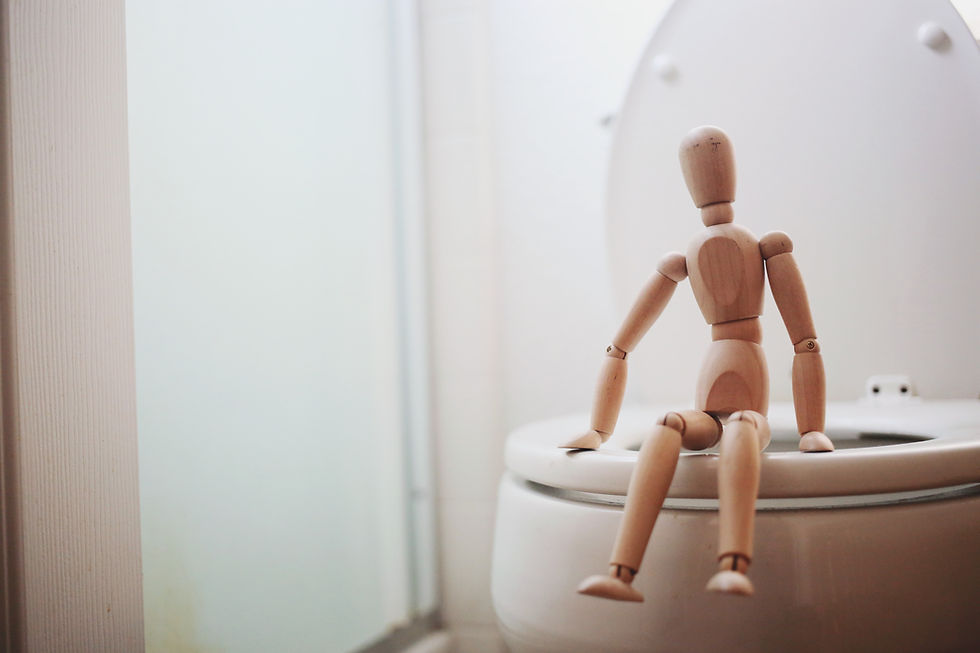What is your Poop Telling You?
- Sep 28, 2021
- 3 min read
Updated: Nov 2, 2021
Poop is probably not a hot topic in your household. But the composition of what you deposit into the toilet has important implications for health. Did you know the features of fecal matter--such as the size, color, shape, odor, and consistency indicate how well the gastrointestinal (GI) tract is functioning? Those same features also provide clues about how your body is (or isn't) faring against threats of infection and more serious diseases. To give you an idea of what healthy, normal stool looks like, check out the Bristol Stool Chart. The healthy range for fecal matter is of a consistency that is not too hard, not too soft, and mostly solid--as opposed to lumpy, pellet-like, or liquid. Normal stool color is in the light-to-medium brown range and is not offensively odorous. Bowel movements (BMs) should pass easily from your body to the toilet.
5 BMs that Require Medical Attention.
Unless you are aware of dietary changes or a medication that could produce the following types of stool, it’s advisable to seek medical attention if you observe the following changes in BMs.

1. Stool that is hard to pass, requires straining or is accompanied by abdominal pain.
2. Black, tarry stool might indicate infection or GI bleeding, while bright red stool could indicate infection and/or bleeding in the GI tract or anus. Seek medical attention.
3. White, pale, or grey stool could indicate problems with the liver, bile ducts, or pancreas.
4. Yellow stool could indicate a serious infection or gallbladder problems.
5. Mucus in the stool can indicate inflammation, infection, or even cancer.
How Often Should You Go?
How frequently you have a BM is important, too. And, what's typical for you may be different for other people in your family. For most people, three weekly BMs are considered the norm. No matter how often you poop, you should not have to strain or experience pain while excreting. Additionally, be aware that the appearance and frequency of BMs will vary based on what's in your diet, sleep and exercise patterns, hormonal changes, travel, stress, hydration level, medications or supplements you are taking, and exposure to toxins.

How Low Should You Go?
There's also evidence that the position you take to evacuate the bowels has health implications for the physical structures of the GI tract. Some scientists indicate sitting to poop is a contributing factor in the development of colon and pelvic diseases. There is a difference between squatting and sitting: The modern toilet places the thighs at a 90-degree angle to the abdomen, whereas squatting has a much deeper angle that gives more motility to the intestinal muscles and organs. Evacuating the bowels is much easier on the body in the squatting versus seated position. Toilet position should be a consideration for everyone over the age of five but is especially important for the elderly, the disabled, and individuals with compromised mobility.
Probiotics
With 80% of your immune system located in your gut, having balanced intestinal flora is a major factor in defending your body against disease. Balanced gastrointestinal (GI) flora is critical to the functioning of the immune system, synthesis of nutrients, and detoxification. Balanced GI flora is also necessary for regular and normal bowel movements. Flora imbalances can be caused by poor diet, illness, use of antibiotics, and stress. Symptoms can include persistent gas, bloating, constipation, or diarrhea. To maintain or rebalance GI flora, consider adding probiotics to your diet. Probiotics are live microorganisms (in most cases, bacteria) that are similar to the beneficial microorganisms naturally found in your GI tract. The most common probiotic bacteria come from two groups, lactobacillus or bifidobacterium, although many other types of bacteria are also classified as probiotics. Scientific evidence shows these probiotics boost the immune system by enhancing the production of antibodies; support the synthesis of vitamins and other nutrients; relieve the effects of, and treat, intestinal illness (diarrhea, constipation, IBS); prevent and treat vaginal yeast infections and urinary tract infections; may reduce the risk of colon or bladder cancer.
Two ways to boost healthy GI flora are to take a probiotic supplement or add probiotic-containing foods to your diet. Check with your doctor or holistic health practitioner to be sure you select a product that meets your personal health needs. Click here for a recommended supplement list, specifically designed for you.




Comments